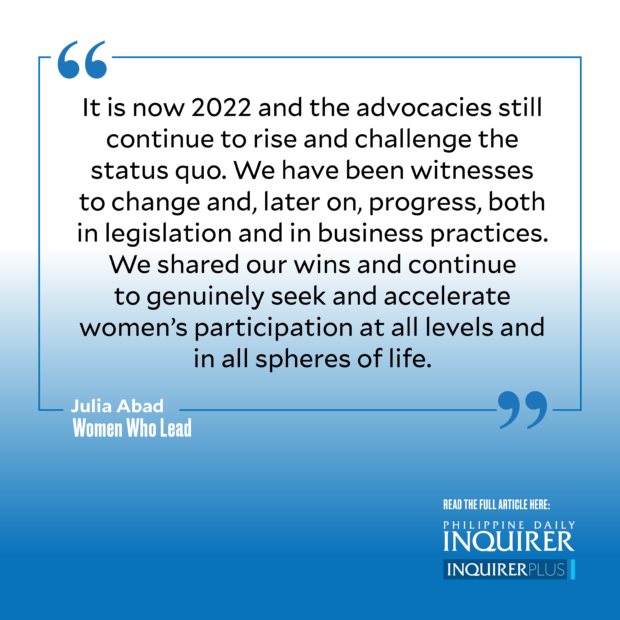Empowering workplaces for a brighter Philippines
In recent years, issues around gender equality and women empowerment have gained much attention. Women have stood up and spoken about previously taboo topics, such as the gender pay gap and sexual harassment, and many did so at great personal and professional risk.
It is now 2022 and the advocacies still continue to rise and challenge the status quo. We have been witnesses to change and, later on, progress, both in legislation and in business practices. We shared our wins and continue to genuinely seek and accelerate women’s participation at all levels and in all spheres of life.
While laws and policies are in place, institutional and sociopolitical structures are still present and continue to keep societies from attaining full equality. Factors such as discrimination, unpaid care work, underrepresentation of women in decision-making and leadership positions, and the lack of access to infrastructure and services hinder women from achieving their full potential.
Given such issues still arise, the private sector has led programs of their own to support women to stay in the labor force. Allow me to share with you some of the best practices of our member companies in the Philippine Business Coalition for Women Empowerment (PBCWE), which I represent today.
Accenture in the Philippines. As early as 2015, Accenture implemented its maternity leave policy of 120 calendar days, which goes above and beyond the minimum requirement of the Philippine laws.
Ayala Land Inc. PBCWE worked with ALI on a case study on embracing digitalization for employee training and development published in 2021. They shared that they are now more conscious of inclusion and the importance of diversity in their training programs, ensuring that female employees participate despite the work-from-home setting, which affects their ability to train due to domestic responsibilities.
Insular Life. Featured in another of PBCWE’s case studies, InLife introduced a comprehensive company health plan as part of a larger effort to safeguard health and well-being, covering maternity benefits for employees and dependents. The company sought to create a more family-oriented benefits package as a strategy for women to join the workforce. For InLife, it is about “creating an outrageously good employee experience.”
Meralco. Meralco believes that diversity is a key enabler of business performance and sustainable growth. True to Meralco’s #PoweringTheGoodLife campaign, the company launched its gender diversity and inclusion program called #Mbrace with the goal of developing and implementing initiatives that will help shape a more gender-balanced workplace. Presently, Meralco’s workforce comprised 32 percent women, almost triple the global energy sector average of 11 percent.
Philippine National Bank. PNB, recognizing that women are the usual victims of sexual harassment and discrimination, has strengthened its antisexual harassment policy and implementation. Living up to the bank’s motto of “putting people first” and ensuring a safe workplace for its employees have helped them gain the trust of their people.
SGV & Co. SGV & Co.’s policies are aligned with the firm’s purpose and goal of “nurturing leaders and enabling businesses for a better Philippines.” In line with the firm’s commitment to diversity and inclusion, sustainability, and people development through its flexible work arrangement policies, SGV & Co. embraced the concept that the ability to work anywhere is a key differentiator for recruitment and critical to employee productivity.
These leading companies clearly prioritize workplace gender equality and show a firm commitment to change. Reiterating the call to action presented during the Business Case for Change Launch in 2020, we call for inclusive progress that is leadership-driven, measurable, decent, equitable, and attainable.
——————
Julia Abad is executive director of the PBCWE.
——————
Women Who Lead is an initiative of the Philippine Women’s Economic Network (PhilWEN).





















